module3
Module3教案
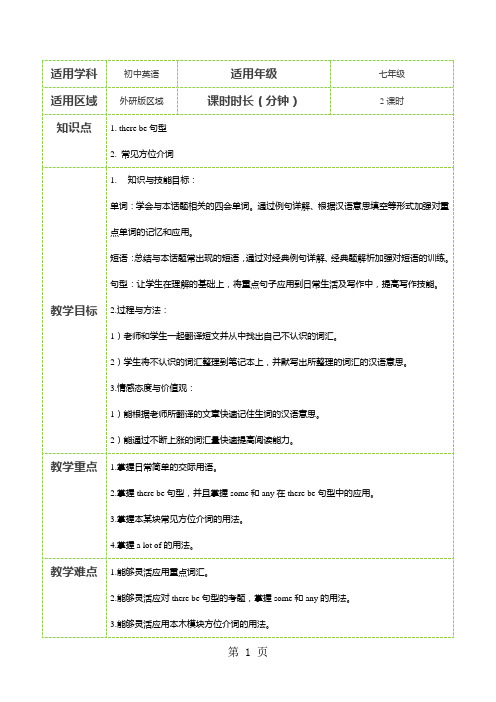
适用学科初中英语适用年级七年级适用区域 外研版区域课时时长(分钟)2 课时知识点 1. there be 句型2. 常见方位介词1. 知识与技能目标:单词:学会与本话题相关的四会单词。
通过例句详解、根据汉语意思填空等形式加强对重点单词的记忆和应用。
短语:总结与本话题常出现的短语,通过对经典例句详解、经典题解析加强对短语的训练。
句型:让学生在理解的基础上,将重点句子应用到日常生活及写作中,提高写作技能。
教学目标 2.过程与方法:1)老师和学生一起翻译短文并从中找出自己不认识的词汇。
2)学生将不认识的词汇整理到笔记本上,并默写出所整理的词汇的汉语意思。
3.情感态度与价值观:1)能根据老师所翻译的文章快速记住生词的汉语意思。
2)能通过不断上涨的词汇量快速提高阅读能力。
教学重点 1.掌握日常简单的交际用语。
2.掌握 there be 句型,并且掌握 some 和 any 在 there be 句型中的应用。
3.掌握本某块常见方位介词的用法。
4.掌握 a lot of 的用法。
教学难点 1.能够灵活应用重点词汇。
2.能够灵活应对 there be 句型的考题,掌握 some 和 any 的用法。
3.能够灵活应用本木模块方位介词的用法。
第1页教学过程一、导入1、 T: hello ,everyone.what can you see in our class?such as desk, blackboard and chair. Who cantell me what can you see in our school?S: I can see many trees and flowers in our school.T: very good.OK,today we will talk about our school.let’s get together describe our school.2、使用以下填空题进行预习知识的检查Ⅰ.词汇短语1.__________ n.兄弟2.___________ n.女儿3.__________ n.父亲4.___________ n.母亲5.__________ n.父\母亲6.__________ n.照片7.__________ prep.这些8.__________ n.左边\adj.左边的9.__________ n.成年女子10.__________ n.丈夫11.__________ n.前面12.__________ n.站;车站13.__________ n.医院14.__________ n.饭店15.__________ n.警察16.__________ n.剧院17.__________ n.男演员18.__________ n.司机19.__________ n.护士20.__________ n.经理21.__________ 紧挨着22. __________ 在......的前面(内部)23.__________ 在同一家医院24.__________ 一位公交车司机【 答 案 】 1.brother2.daughter3.father4.mother5.parent6.photo7.these8.left9.woman10.husband11.front12.station13.hospital14. hotel15.police16.theatre\theater 17.actor18.driver19.nurse20.manager第2页21.next to Ⅱ.活用句型22.in the front of 23.at the same hospital 24.a bus driver1.What a big family! 【句式仿写】多么小的一把椅子啊!______________________________________________________________________2.Who is this? 【句式仿写】那是谁?________________________________________________________________________3.This is a pen. 【句式仿写】这是一名警察。
外研版八年级上册Module 3知识点整理
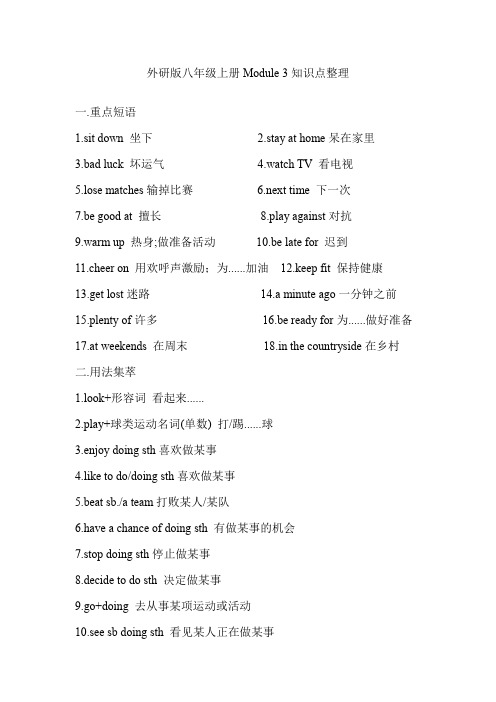
外研版八年级上册Module 3知识点整理一.重点短语1.sit down 坐下2.stay at home呆在家里3.bad luck 坏运气4.watch TV 看电视5.lose matches输掉比赛6.next time 下一次7.be good at 擅长8.play against对抗9.warm up 热身;做准备活动10.be late for 迟到11.cheer on 用欢呼声激励;为......加油12.keep fit 保持健康13.get lost迷路14.a minute ago一分钟之前15.plenty of许多16.be ready for为......做好准备17.at weekends 在周末18.in the countryside在乡村二.用法集萃1.look+形容词看起来......2.play+球类运动名词(单数) 打/踢......球3.enjoy doing sth喜欢做某事4.like to do/doing sth喜欢做某事5.beat sb./a team打败某人/某队6.have a chance of doing sth 有做某事的机会7.stop doing sth停止做某事8.decide to do sth 决定做某事9.go+doing 去从事某项运动或活动10.see sb doing sth 看见某人正在做某事11.一段时间+ago ......之前12.the+比较级,the+比较级越......,就越......13.What’s the matter with sb./sth.?某人/某物怎么了?三.重点句型1.Nothing is more enjoyable than playing tennis.没有什么比打网球更令人愉快的.2.What’s the matter with you,Tony?你怎么了,托尼?3.That’s because it was cheaper than buying tickets for all the games. 那是因为对所有比赛来说,通过看电视(看比赛)比买票更便宜.4.Which sport do you like,swimming or running?游泳和跑步,你喜欢哪项运动?四.语法归纳:形容词比较级,副词的基本用法和副词的比较级.(一)教材中含有形容词副词比较级的句型1.Nothing is more enjoyable than playing tennis.没有什么比打网球更令人愉快的.2.We are training harder than usual.我们比平常更加努力地训练.3.It is more difficult to practice in winter.在冬天训练更加困难.(二)语法归纳1.形容词的比较级单音节和部分双音节形容词通常在词尾加-er构成比较级.一部分双音节词和所有的多音节形容词在词前加more构成比较级.Popular-more popular difficult-more difficult famous-more famous2.副词的基本用法副词主要用来修饰动词,形容词和副词。
四年级英语上册Module 3

Module 3Activitis单元教材分析1.本模块内容,围绕正在发生的事情互相之间的对话,学习正在发生的事情的表达用动词+ing。
2.重点学习句型What are you doing?及回答时动词的ing形式的使用。
新授词组及单词listen to 、 read 。
单元教学目标1.知识与技能:句型:(1)---What are you doing? ---I ' m …(2)---What is he\she doing? ---He\She is …2.过程与方法:通过游戏,顺口溜等多种教学方法激发学生的学习兴趣,进而较好的掌握重点知识。
3.情感态度价值观:培养学生积极主动的学习态度,能大胆开口,积极参与各项学习活动,善于与同学交流。
单元训练重难点重点难点1.词组:watching TV、talking to … 、taking pictures、reading a book 、writing a letter playing with listening to music2.句型:(1)---What are you doing?---I‘m …(2)---What is he\she doing?---He\She is …(3)---What are they doing? ---They are学习如何表述及问答正在发生的动作单元课时安排Unit 1 2课时Unit 2 2课时第一课时课题 Unit 1 She’s writing a letter.主备人李文芳授课班级四年级授课人授课时间教学目标1.识与技能:掌握本课所学单词,培养学生用英语进行交流,养成用英语思维的良好习惯,提高学生的创造力和实践能力。
句型: 1、---This is my friend. 2、--She is writing a letter.2.程与方法:通过谈论图片学习如何讲述正在发生的事情。
3.感、态度和价值观:培养学生积极主动的学习态度,能大胆开口,积极参与各项学习活动,善于与同学交流。
Module 3 知识要点

Module 3 知识要点一. 模块重点词语1.get on (a bus/a plane/a ship等) 上(车、船)get off 下(车、船)2.get into (a car/a taxi) 上(车)get out of 下车3.ride a motorbike 骑摩托车4. land a plane/ a ship 使飞机着陆/船舶靠岸5.take off vi(飞机)起飞vt.脱去(衣服)6. refer to ①(意)指②谈到,提及= talk of ③参考,参阅比较:refer to a dictionary for a new word = look up a new word in a dictionary7. abandon (doing) sth遗弃;终止8. pass a law通过一项法律break the law违反法律obey/keep / observe/respect the law遵守法律by law依照法律9. allow sb.to do sth. 允许某人做某事(be allowed to do sth) allow doing sth. 允许做某事10. take the/a train to sp. = go to sp. by train.乘火车去某地11. on the coast在沿海地区off the coast在近海(的)12. be short for 是……的缩写、简称拓展:be short of 缺乏13. out of date 过时的;过期的14. in the distance 在远处/方,远处的15. at a/the speed of 以……速度16. for the first time 第一次比较:the first time sb. did sth. = when sb. did sth. for the first time17.in the 1920s 在20世纪20年代(注意the)比较:in 192018. be expert at/in --- 是------方面的专家,擅长--------= be good at19. Absolutely! 绝对地如此!当然是! Definitely! 肯定! 当然!20. not any more 不再;没有更多的(用于表示数量或动作的不再延续)即学即练单项选择1. Despite some difficulties, they’re not going to ________ the p lan.A. abandonB. give inC. arrangeD. lose2. It is not rare in ___ that people in___ sixties are going to university for further education.A.90s; theB. the 90’s; /C. 90’s; theirD. the 90s; their3. Seeing the thief run into the shop, the policeman ______ his police car and ran after him.A. got downB. got onC. got intoD. got out of4. ---Excuse me, is this Mr. Brown’s office?--- I’m sorry, but he ___ work here ____. He left about 3 weeks ago.A. doesn’t, nowB. didn’t, no moreC. doesn’t, any moreD. doesn’t, any longer5. The president spoke at the meeting for nearly an hour without _______ his note.A. bringing upB. referring toC. looking forD. trying on6. Mary got ______ the bus, got ______ a car and then disappeared _______the distance.A. off; on; inB. out of; into; inC. off; into; inD. out of; on; in7. Will you ask the scientist who was referred _____ us a report?A. to giveB. to to giveC. to givingD. to be given8. — Did you spend a lot of time looking for the lost child?— ________. It took us half a month, but luckily we found him.A. My pleasureB. AbsolutelyC. Not at allD. Don’t mention it9. — Oh, my God! Bu t weren’t you tired of doing so much work in a day?— ________ We were exhausted.A. Is that right?B. Definitely!C. No way!D. Oh, I see.二.模块重点句式1. Where do you think most of the people live, in the central part of the country or on the coast?疑问词+ do you think/believe/consider/suppose/imagine/ guess/expect /suggest +陈述句结构2. 1)supply n. 供给物,供应品2) supply v.供给,供应①supply sb. with sth.=supply sth. to sb.②provide sb. with sth..=provide sth. for sb.②offer sb. sth.=offer sth. to sb. (接双宾语)We provide people in earthquake-hit areas with supplies.(各种形式替换表达)= We provide supplies for people in earthquake-hit areas.= We supplied people in earthquake-hit areas with supplies.= We supplied supplies to people in earthquake-hit areas.= We offer people in earthquake-hit areas supplies.= We offer supplies to people in earthquake-hit areas.即学即练重点词语/句式专练:1. All the rooms are ___ with electric light.A. suppliedB. givenC. offeredD. burnt2. __________ is the most useful invention?A. Do you think which of theseB. Which of these do you thinkC. Which of these you thinkD. You think which of these三. 模块重点语法;一、过去分词作定语1.前置定语①及物动词的过去分词表示被动和完成意义,如:trained camels②不及物动词的过去分词表示完成的意义,如: the fallen leaves注意:a worried look/face/expression着急的神情2.后置定语过去分词短语作定语时,通常放在被修饰的名词之后,如:Is this the book written by Henry James?即学即练1. The first textbook ________for teaching English as a foreign language came out in the 16th century.A. having writtenB. writtenC. being writtenD. to be written2. For breakfast he only drinks juice from fresh fruit ____ on his own farm.A. grownB. being grownC. to be grownD. to grow3. A letter _____ today will probably reach her the day after tomorrow.A. will be postedB. postedC. to postD. posting4. There was an _________ look on his face when the actress appeared.A. excitedB. excitementC. excitingD. excitedly5. It’s wrong for the ________ countries to control the world.A. developmentB. developingC. developedD. develop6. Most of the artists________ to the party were from South Africa.A. invitedB. to inviteC. being invitedD. had been invited7. The ______ audience felt more _______after they knew the film would be put off.A. disappointed ; boringB. disappointing ; boredC. disappointed; boredD. disappointing; boring8. Mr. White showed her students some old maps _____ from the library.A. to borrowB. to be borrowedC. borrowedD. borrowing9. Did anyone call to ask about the position _____ in yesterday’s China Daily?A. advertisedB. to be advertisedC. advertisingD. having advertised10. A great number of students ____ said they were forced to practise the piano.A. to questionB. to be questionedC. questionedD. questioning二、一般过去时过去的时态包括一般过去时,过去进行时,过去完成时和过去完成进行时。
外研版八年级英语上册 Module-3 知识归纳
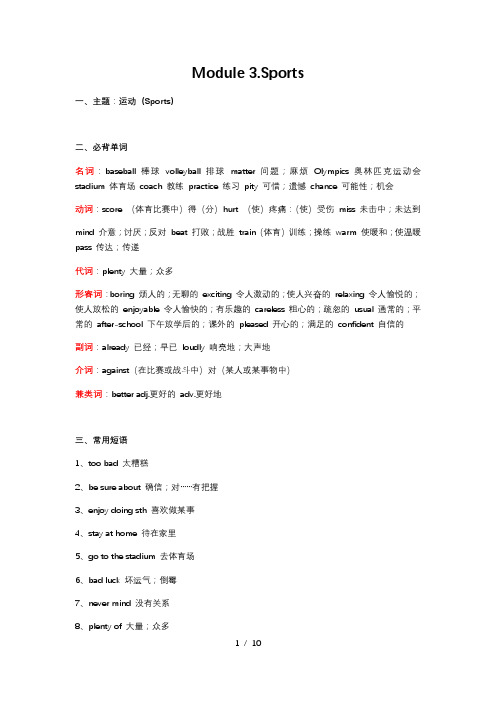
Module 3.Sports一、主题:运动(Sports)二、必背单词名词:baseball 棒球volleyball 排球matter 问题;麻烦Olympics 奥林匹克运动会stadium 体育场coach 教练practice 练习pity 可惜;遗憾chance 可能性;机会动词:score (体育比赛中)得(分)hurt (使)疼痛:(使)受伤miss 未击中;未达到mind 介意;讨厌;反对beat 打败;战胜train(体育)训练;操练warm 使暖和;使温暖pass 传达;传递代词:plenty 大量;众多形容词:boring 烦人的;无聊的exciting 令人激动的;使人兴奋的relaxing 令人愉悦的;使人放松的enjoyable 令人愉快的;有乐趣的careless 粗心的;疏忽的usual 通常的;平常的after-school 下午放学后的;课外的pleased 开心的;满足的confident 自信的副词:already 已经;早已loudly 响亮地;大声地介词:against(在比赛或战斗中)对(某人或某事物中)兼类词:better adj.更好的adv.更好地三、常用短语1、too bad 太糟糕2、be sure about 确信;对……有把握3、enjoy doing sth 喜欢做某事4、stay at home 待在家里5、go to the stadium 去体育场6、bad luck 坏运气;倒霉7、never mind 没有关系8、plenty of 大量;众多9、lose the match 输掉比赛10、a little 有点11、play against 与………比赛12、next week 下周13、as………as sb can 某人尽可能……14、warm up 热身;做准备活动15、beat sb 打败某人16、be late for 迟到17、in the final match 在比赛中18、have a better chance of 有更大的可能性19、hope to do sth 希望做某事20、cheer……on 用欢呼声激励;为……加油21、feel confident to do sth 有信心去做某事22、be pleased with 对………感到满意23、decide to do sth 决定做某事24、keep fit 保持健康25、try doing sth 试着做某事26、join the swimming club 加入游泳俱乐部27、stop doing sth 停止做某事28、go walking 去徒步旅行29、in the mountains 在山里30、all the same 尽管如此,仍然31、see sb doing sth 看见某人正在做某事32、be ready for准备好……33、at weekends 在周末四、重点句型1、比较级句型:(1)Nothing is more enjoyable than playing tennis.(2)This year we are training more carefully.2、the+比较级……,the+比较级……:The more you go jogging, the healthier you will feel.3、so that 引导目的状语从句:We all arrive as early as we can so that we have time to warm up.五.模块语法1、形容词比较级(2)(This week‘s match is already more exciting.)2、副词的基本用法和副词比较级(We are training harder than usual.)Module 3.Sports 运动详细笔记1、boring无聊的【辨析】boring与boredboring( not interesting)形容词,意为“烦人的;无聊的”,多用来形容事物,指事物本身无趣。
沪教版小学三年级英语上册《module3p…》教案及教学反思
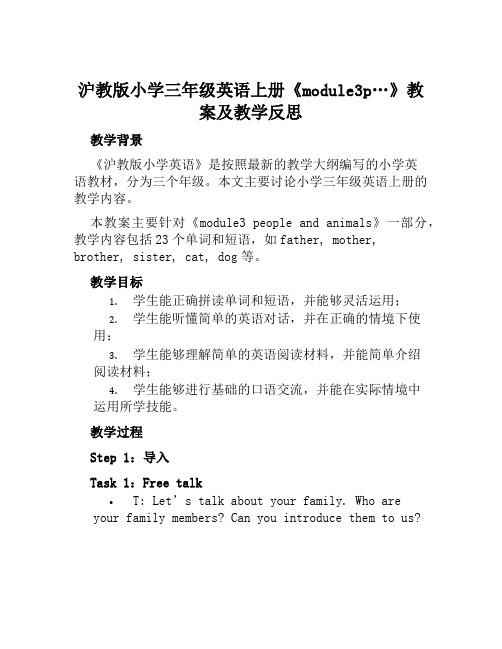
沪教版小学三年级英语上册《module3p…》教案及教学反思教学背景《沪教版小学英语》是按照最新的教学大纲编写的小学英语教材,分为三个年级。
本文主要讨论小学三年级英语上册的教学内容。
本教案主要针对《module3 people and animals》一部分,教学内容包括23个单词和短语,如father, mother, brother, sister, cat, dog等。
教学目标1.学生能正确拼读单词和短语,并能够灵活运用;2.学生能听懂简单的英语对话,并在正确的情境下使用;3.学生能够理解简单的英语阅读材料,并能简单介绍阅读材料;4.学生能够进行基础的口语交流,并能在实际情境中运用所学技能。
教学过程Step 1:导入Task 1:Free talk•T: Let’s talk about your family. Who are your family members? Can you introduce them to us?Task 1:Teach the words•T: Now let’s learn some new words related to people and animals. (出示图片并介绍新单词。
) Ok, let’s learn to say these words and phrases together. Father…Mother…Brother…Sister…Grandfather…Grand mother…Uncle…Aunt…Cousin…Cat…Dog…Elephant…Ti ger…Lion…Monkey…Rabbit…Task 2:Listen and repeat•T: Please listen to me and repeat after me. Step 3:训练Task 1:Group work•T: Let’s have a group work. I will dividethe class into several groups. Each group will have a different picture and need to talk about thefamily members and animals in the picture. (给出图片并安排学生分组。
六年级上册英语第三模块课文

外研版英语六年级上册第三单元Module3 Unit 1 Have you got any stamps from China ?1.Look , listen and say .I have got some food from China .Have you got any fish from China ?Sorry,I haven’t .But I love Chinese fish .2.Listen , read and act out .Daming :What are you doing,Simon ?Simon :I am putting my new stamps into my stamp book . These are stamps from Canada . And these are stamps from the UK . And these ones are very , very old . They’re from the US.Daming :Have you got any stamps from China ?Simon:No,I haven’t . You always send me emails. You don’t send me letters , so I haven’t got any Chinese stamps !Daming :I will send you lots of Chinese stamps.Simon:Thank you .Simon:Do you collect stamps?Daming :No, I don’t . But it is a good idea .Simon : Here are some stamps from the US and Canada for you .Daming : Thank you .Simon:You can make a stamp book with them .Daming :Great !Module 3 Unit 2 Collecting stamps is my hobby1.Look , listen and say .It is a picture of the sun .It is a picture of the moon .Oh, it is a picture of my friend from the moon !2.Listen and read .Collecting stamps is my hobby . This is my favourite Chinese stamps. It is a picture of Hainan Island , my favourite place in China . We can see the Five-Finger Mountain and a coconut tree . I love it .。
Module3模块知识必备清单
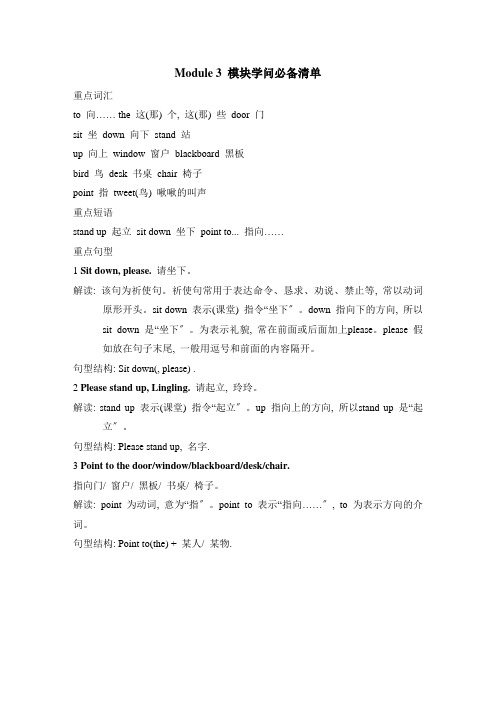
Module 3 模块学问必备清单
重点词汇
to 向…… the 这(那) 个, 这(那) 些door 门
sit 坐down 向下stand 站
up 向上window 窗户blackboard 黑板
bird 鸟desk 书桌chair 椅子
point 指tweet(鸟) 啾啾的叫声
重点短语
stand up 起立sit down 坐下point to... 指向……
重点句型
1 Sit down, please. 请坐下。
解读: 该句为祈使句。
祈使句常用于表达命令、恳求、劝说、禁止等, 常以动词原形开头。
sit down 表示(课堂) 指令“坐下〞。
down 指向下的方向, 所以sit down 是“坐下〞。
为表示礼貌, 常在前面或后面加上please。
please 假如放在句子末尾, 一般用逗号和前面的内容隔开。
句型结构: Sit down(, please) .
2 Please stand up, Lingling. 请起立, 玲玲。
解读: stand up 表示(课堂) 指令“起立〞。
up 指向上的方向, 所以stand up 是“起立〞。
句型结构: Please stand up, 名字.
3 Point to the door/window/blackboard/desk/chair.
指向门/ 窗户/ 黑板/ 书桌/ 椅子。
解读: point 为动词, 意为“指〞。
point to 表示“指向……〞, to 为表示方向的介词。
句型结构: Point to(the) + 某人/ 某物.。
外研社版高中英语必修三-Module-3-基础知识整理

外研社版高中英语必修三-Module-3-基础知识整理单词派生:flood-flooding-floodedlighting-light-lit-lightedcurrent-currently-currencyrotating-rotateviolent-violently-violenceash-ashtraytidal-tidevolcano-volcanicerupt-eruptionterrifying-terrify-terrifiedluckily-luck-lucky-unluckythankfully-thank-thanks-thankfulhopefully-hopeful-hope-hopeless-hopelesslysadly-sadfortunately-fortunate-fortunewarning-warnworldwide-worldactive-act -actor-actressdamage-damagedpossibility-possible-impossible-impossibilityexperience-experiencedput outin all/ all in all/ after all/on average单词:1.experience vt.经历,体验;感受到n.经历经验experienced adj.有经验的;熟练的Besides relaxing with these more commonentertainments, astronauts can simply enjoy the experience of living in space.(2012?辽宁阅读B)除了用这些更为常见的娱乐放松之外,宇航员还可以尽情体验在太空中的生活。
(经验)a teacher with much experience/ (经历)a very interesting experiencefrom/by experience凭经验;从经验中(得出)have experience in ... 有……的经验/经历be experienced in ... 在……方面有经验full of experiencein one’s experience 根据某人的经验来看He has much experience in teaching.他有丰富的教学经验。
沪教牛津版版三年级上册英语 Module 3 知识清单
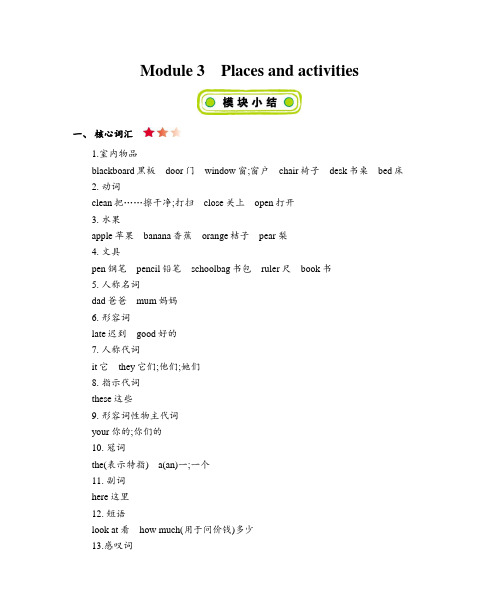
Module 3Places and activities一、核心词汇1.室内物品blackboard黑板door门window窗;窗户chair椅子desk书桌bed床2. 动词clean把……擦干净;打扫close关上open打开3. 水果apple苹果banana香蕉orange桔子pear梨4. 文具pen钢笔pencil铅笔schoolbag书包ruler尺book书5. 人称名词dad爸爸mum妈妈6. 形容词late迟到good好的7. 人称代词it它they它们;他们;她们8. 指示代词these这些9. 形容词性物主代词your你的;你们的10. 冠词the(表示特指)a(an)一;一个11. 副词here这里12. 短语look at看how much(用于问价钱)多少13.感叹词please请二、核心句型1. Close the door, please. 请关上门。
解读: 该句型是祈使句,用于表达请求、命令或劝告等。
句型结构:动词原形 + 其他.举一反三: Open the window, please. 请打开窗户。
Read a book, please. 请读本书。
Look at me! 看着我!2. How much is it? 它多少钱?How much are they? 它们多少钱?解读: how much意为“(用于问价钱)多少”。
如果be动词后面的主语是不可数名词或可数名词单数,be动词用is,回答时常用“(It’s + )数词 + 货币单位.”;如果be动词后面的主语是可数名词复数,be动词用are,回答时常用“(They’re + )数词 + 货币单位.”。
若回答是中国的货币单位应采用汉语拼音yuan,fen等,几角常采用几十分来表示,首字母小写,且不用复数。
举一反三: — How much is a book? 一本书多少钱?— Ten , please. 十元。
外研社七年级下册英语:module 3 重点知识及训练(单词短语,语法,练习)(有答案)

Module 3 重点单词和短语go over复习;练习picnic['pɪknɪk] n.野餐housework ['haʊswɜːk] n.家务劳动on prep.在……时候else[els]adv.其他; 另外nobody['nəʊbədɪ]pron.没有人at prep.在……点钟nothing['nʌθɪŋ] pron.没有什么; 没有东西silly['sɪlɪ]adj.愚蠢的; 傻气的fantastic[fæn'tæstɪk]adj.极好的forward ['fɔːwəd] adv.面向未来的; 向前look forward to盼望fan[fæn] n.迷; 支持者make friends 交朋友shirt [ʃɜːt] n.球衣; (男式)衬衫cheer[tʃɪə]v.为……喝彩player['pleɪə]n.运动员;选手hope [həʊp]v.希望win[wɪn]v. ( won ) 赢;获胜enjoy oneself过得愉快myself[maɪ'self; mɪ'self]pron.我自己during ['djʊərɪŋ]prep.在......期间May [meɪ]n. 5月May Day五一劳动节late [leɪt]adv.迟; 晚adj.迟的; 晚的walk [wɔːk] n.步行; 走take a walk散步country['kʌntrɪ]n.乡下; 乡村second ['sek(ə)nd] num.第二collect[kə'lekt]v.收集litter['lɪtə] n.垃圾fun[fʌn] n.娱乐; 乐趣summer holiday暑假camp [kæmp] n.营地;帐篷Australian [ɑ'strelɪən]adj.澳大利亚的sightseeing ['saɪtsiːɪŋ] n.观光; 游览go sightseeing观光beach [biːtʃ] n.海滨; 海滩early ['ɜːlɪ] adv.早; 提前adj.早的语法回顾1. at the weekend: 在周末on weekdays: 在平日e.g. We should study hard on weekdays and have a good rest at the weekend.2. on Saturday morning/ afternoon/ evening 在星期六的早晨/下午/晚上具体指“在某一天(或有修饰词)的上午/ 下午/ 晚上”用介词“on” 。
六年级上册Module 3知识梳理
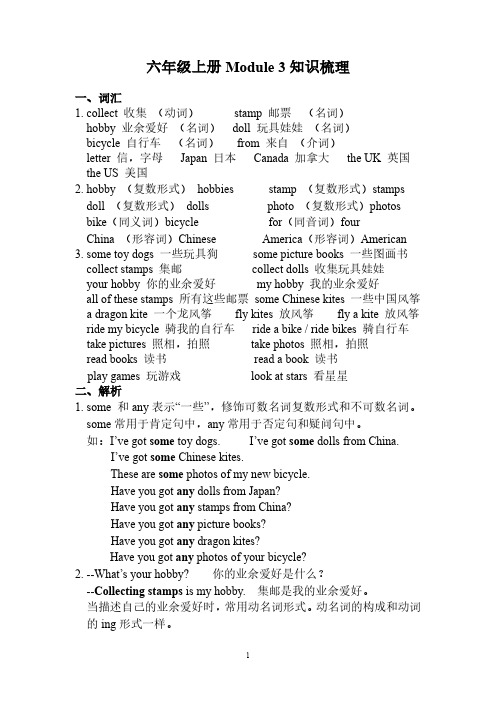
六年级上册Module3知识梳理一、词汇1.collect收集(动词)stamp邮票(名词)hobby业余爱好(名词)doll玩具娃娃(名词)bicycle自行车(名词)from来自(介词)letter信,字母Japan日本Canada加拿大the UK英国the US美国2.hobby(复数形式)hobbies stamp(复数形式)stamps doll(复数形式)dolls photo(复数形式)photos bike(同义词)bicycle for(同音词)fourChina(形容词)Chinese America(形容词)American 3.some toy dogs一些玩具狗some picture books一些图画书collect stamps集邮collect dolls收集玩具娃娃your hobby你的业余爱好my hobby我的业余爱好all of these stamps所有这些邮票some Chinese kites一些中国风筝a dragon kite一个龙风筝fly kites放风筝fly a kite放风筝ride my bicycle骑我的自行车ride a bike/ride bikes骑自行车take pictures照相,拍照take photos照相,拍照read books读书read a book读书play games玩游戏look at stars看星星二、解析1.some和any表示“一些”,修饰可数名词复数形式和不可数名词。
some常用于肯定句中,any常用于否定句和疑问句中。
如:I’ve got some toy dogs.I’ve got some dolls from China.I’ve got some Chinese kites.These are some photos of my new bicycle.Have you got any dolls from Japan?Have you got any stamps from China?Have you got any picture books?Have you got any dragon kites?Have you got any photos of your bicycle?2.--What’s your hobby?你的业余爱好是什么?--Collecting stamps is my hobby.集邮是我的业余爱好。
七年级英语Module3知识点讲解课件

—D.
A.That's all right B.Not at all
C.Thank you
D.Yes,I'd love to
9.你想和我们一起去观光吗?
Would you like to go sightseeing with us?
10.我想去澳大利亚观光。
I'd like to go sightseeing in Australia.
Module 3 Making plans
1、时间介词on、in、at ➢ on 用于星期、日期,
还可以表示在具体某天的上午、 下午或晚上 ➢ in 用于年、月、季节,
还可以和morning、afternoon、evening搭配 ➢ at 用于时间点,
还可以和noon、night搭配
例如:We often visit our grandparents on Sunday afternoon. 我们经常在周日下午去看望我们的爷爷奶奶。
他们去操场为运动员们喝彩了。 翻译:我们打算为运动员们喝彩。
We're going to cheer the players.
短语:cheer up 使变得更高兴;振奋起来 例如:Let's do something to cheer him up. 让我们做一些事情使他振奋起来吧。
1.Jack is going to cheer [tʃɪə] his favourite football team this weekend. 2.We are going to the playground to cheer (为……喝彩) the runners.
1.你想和我一起复习功课吗?
Would you like to go over lessons with me?
Module 3 情绪与情感-【解密英语】高考英语话题系统循环总复习

1.Father is always losing his temper.
He gets angry (anger) with my mother and us kids.
2.Nowadays, the majority of the white-collar workers
feel stressed (stress) as their jobs are stressful (stress). 3.I hate noise. I prefer to live alone (lone). 4.The old man needs companions to relieve his loneliness (lonely).
(十一)担忧
worry about 担心 be worried about 担心 concern v.& n.担忧,担心,忧虑 concerning a.让人担忧的 be concerned about 担忧;挂念 [对比]be concerned with与……有关 care about 关心,牵挂 be anxious about sth. 为……而担忧/忧虑
(四)悲痛,伤心
sad a.悲伤的,伤心的 She is ~ to miss the chance. 错过机会,她很伤心。 sadness n. sorrowful a.悲伤/痛的 sorrow n.悲伤;伤心事 To my ~, my interview is a failure. 让我难过的是,我的面试失败了。 sorry a.难过的;遗憾的 be~ about sth.为某事难过
Ⅱ.汉译英 1.获得一等奖,孩子们的情绪很高。
Winning the first prize, the children are in high spirits.
Module3模块大归纳
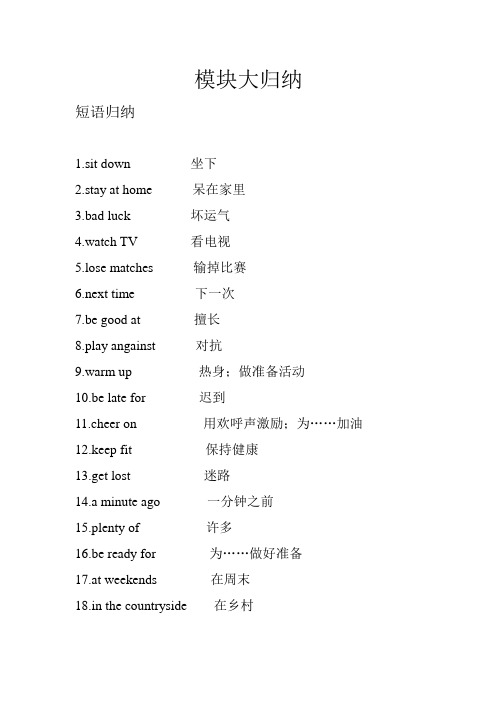
模块大归纳
短语归纳
1.sit down 坐下
2.stay at home 呆在家里
3.bad luck 坏运气
4.watch TV 看电视
5.lose matches 输掉比赛
6.next time 下一次
7.be good at 擅长
8.play angainst 对抗
9.warm up 热身;做准备活动
10.be late for 迟到
11.cheer on 用欢呼声激励;为……加油
12.keep fit 保持健康
13.get lost 迷路
14.a minute ago 一分钟之前
15.plenty of 许多
16.be ready for 为……做好准备
17.at weekends 在周末
18.in the countryside 在乡村
用法集萃
1.look+形容词看起来……
2.play+球类运动名词(单数)打、踢……球
3.enjoy doing sth. 喜欢做某事
4.like+to do/doing sth. 喜欢做某事
5.beat sb./a team 打败某人/某队
6.have a chance of doing sth. 有做某事的机会
7.stop doing sth. 停止做某事
8.decide to do sth. 决定做某事
9.go+doing 去从事某项运动或活动
10.see sb. doing sth. 看见某人正在做某事
11.一段时间+ago ……之前
12.What’ the matter with sb./sth.? 某人/某物怎么了
13. the+比较级,the+比较级越……,就越……。
七年级上册英语module3知识点

七年级上册英语module3知识点七年级上册英语Module 3知识点Module 3是七年级上册英语的一个重要的模块,主要涉及到一些日常生活的词汇和句型。
以下是本模块的主要知识点:1. Days of the weekModule 3首先介绍了一周的七天,即Monday, Tuesday, Wednesday, Thursday, Friday, Saturday和Sunday。
这些词汇是基本的日常生活用语,在日常交流中经常使用。
2. Time在Module 3中,学生们也学习了一些有关时间的表达方式。
例如:It’s... o’clock.、It’s... thirty.等。
这些词汇和句型可以快速准确地表达时间,对于日常交流和学习都很有用。
3. Common phrasesModule 3还介绍了一些常用的短语,如:in themorning/afternoon/evening等。
这些短语在日常生活中也经常被使用。
4. Family membersModule 3还学习了一些家庭成员的词汇,例如father, mother, brother, sister等。
这些词汇是基础的家庭成员词汇,对于日常交流和学习也很有必要。
5. Asking about someone’s age在Module 3中,学生们还学习了有关询问年龄的用语。
例如:How old are you?等。
这些用语可以让学生们更好地了解对方,并进一步沟通交流。
总之,Module 3是七年级上册英语的一个重要模块,涉及到许多基础的日常生活词汇和常用表达方式。
掌握这些知识点,可以为学生们的英语交流和学习提供有力帮助。
- 1、下载文档前请自行甄别文档内容的完整性,平台不提供额外的编辑、内容补充、找答案等附加服务。
- 2、"仅部分预览"的文档,不可在线预览部分如存在完整性等问题,可反馈申请退款(可完整预览的文档不适用该条件!)。
- 3、如文档侵犯您的权益,请联系客服反馈,我们会尽快为您处理(人工客服工作时间:9:00-18:30)。
Module 3
1.到…旅行
2.一个旅游景点
3.上车
下车
4.起飞,脱掉
5.交通工具
6.在远处
从稍远的地方
遥远的
5. .提到,涉及,与…有关,查阅
6. 多么令人愉快的旅行!
7. 恰恰在…中间
8.不仅仅
仅仅
不超过
9.spend的意思
10.scenery scene sight view 的区别
1)The little boy running after the dog made a very amusing _______.
2) You can get a wonderful _____ of the garden through this window.
3) The flowers are a lovely _______ in spring.
4) We enjoyed the beautiful____ of the Apls.
11.被遗弃的
12.大约在半夜时分
13. 做…的方法
14.试着做某事
试图,尽力做某事
15 是…的简称
简称
美利坚合众国简称美国
我的名字叫亚历山大,简称亚尔.
短缺
简言之
不足短缺n.
16.训练有素的骆驼
17.供应品生活用品
为某人提供某物
18直到我回来,他才就寝休息.
他一直工作到11点.
19.通过一部法律
违法
20允许做某事允许某人做某事
建议做某事
建议某人做某事
禁止做某事
禁止某人做某事
21.对…射击
打死,打中某人
22..不再
我将再也不去那里
中国不再是过去那个样子
23. 过时的
过时的衣服
时新的
时新的车
24.你认为他的态度怎么样?(3) 25惊吓n.使害怕vt.
令人害怕的感到害怕的
26.一点也不
27.当然是
29.肯定的
30. 哦,我明白了
31.记得做过某事
记着做某事
忘记了做过某事
忘记了做某事
遗憾地说/告诉
后悔做过某事
意味着
打算做某事
不能帮忙做某事
禁不住做某事
继续做另一件事接着做同一件事停下来做某事
停止正在做的事
需要做
我的表需要修理.
32.interview 的意思
参加面试
采访者被采访者
33.我筋疲力尽地回到家里.
34.以…的速度
一段30公里的旅程
一个5岁的孩子
一个大眼睛的女孩
十层的大楼(2)
意志坚强的男人35.参加开幕式
上课上学
注意倾听
伺候
36在上海市中心
去市中心
37创/保持/打破记录。
